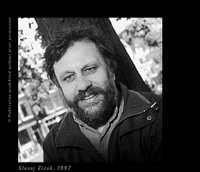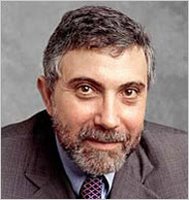

Which of these nice guys wrote the following sentence in today's New York Times" - "in Bushspeak 'modernize' is a synonym for 'privatize.' And one of the main features of the legislation was an effort to bring private-sector fragmentation and inefficiency to one of America’s most important public programs." Was it the liberal free-trader Paul Krugman? Or everyone's favorite Lacanian Leninist, the radical philosopher Slavoj Zizek?
Yes, you guessed from this set-up that the very eloquent blast at private-sector capitalism came this morning from Times regular Krugman. Zizek wrote the top op-ed piece, however, taking up half the page above the fold. He said what he always says: freedom is slavery, desire is domination, and black is white. So he shows that Jeanne Kirkpatrick's definition of totalitarian states actually applies to the United States (ideology overcoming pragmatism). OK, fine, very ironic. Like we hadn't noticed the authoritarian strain in the Bush administration - oops, I mean totalitarian. The fact that I am thinking about these two words together makes me believe that Zizek is as much a creature of the Cold War as is Cheney, but that's a cheap shot so I'll get back to my point.
The walk around the block doesn't work so well this time, but it does show Zizek at home in his middle-class habitat. His tag line comes from Saddam's pre-war spokesperson, who said, as the Americans invaded, "They are not in control of anything — they don’t even control themselves!” This allows Zizek to conclude as follows: "And now the United States is continuing, through other means, this greatest crime of Saddam Hussein: his never-ending attempt to topple the Iranian government. This is the price you have to pay when the struggle against the enemies is the struggle against the evil ghosts in your own closet: you don’t even control yourself."
Really? The US invaded and occupies Iraq and threatens Iran because Bush doesn't control himself? Or Cheney? Actually they control themselves quite well - well enough to ignore any and all facts that conflict with their quite clearly formulated goals. One of their goals is to control the Middle East, its politics and its resources. Bush et al. also control the state and the military, and two branches of the federal government (and still control the Congressional agenda even as the Lapdog Party gets to sit in the big chair for a while). Since Iran is in the way, Iran must be pushed aside somehow. Bush isn't struggling against his evil ghosts, he's struggling against the power of Iran.
Zizek's analysis reproduces middle-class Americanism in three ways. First, it makes the country's will to power over most of the world into an internal psychodrama, "An American Dilemma" in which we wrestle with our good and bad impulses. Second, he reproduces the suburbs' belief in our own basic innocence: he sidesteps the real story, which is that we avert our eyes from the consequences for others while voting for our financial and political interests as they are being protected in Iraq. These are the maintenance of the great and unearned wealth disparity for all of us ordinary American middle-class folks who aren't really better than our Indian or Filipino counterparts who do the same work for a tenth of the pay. Did we all vote for Bush, and then vote for him again, , by mistake? Because we couldn't control ourselves? Because we were controlled by evil elements in our unconscious? Third, Zizek enforces that middle-class truism that the system really isn't controllable and therefore there's nothing for us to do. A radical epistemology of inevitable misrecognition is the identical twin of suburban complacency. "We're all totalitarians now" is the Zizekian Call of the Mall.
Zizek made more sense in the first years after the collapse of the Soviet Union, when ethnic difference was being manipulated by nationalists into dirty civil wars. He furnished a superb one-line explanation for how people could be made to kill their unoffending long-term neighbors: "you, newly-identified as Other, have stolen my enjoyment."
Zizek's analysis reproduces middle-class Americanism in three ways. First, it makes the country's will to power over most of the world into an internal psychodrama, "An American Dilemma" in which we wrestle with our good and bad impulses. Second, he reproduces the suburbs' belief in our own basic innocence: he sidesteps the real story, which is that we avert our eyes from the consequences for others while voting for our financial and political interests as they are being protected in Iraq. These are the maintenance of the great and unearned wealth disparity for all of us ordinary American middle-class folks who aren't really better than our Indian or Filipino counterparts who do the same work for a tenth of the pay. Did we all vote for Bush, and then vote for him again, , by mistake? Because we couldn't control ourselves? Because we were controlled by evil elements in our unconscious? Third, Zizek enforces that middle-class truism that the system really isn't controllable and therefore there's nothing for us to do. A radical epistemology of inevitable misrecognition is the identical twin of suburban complacency. "We're all totalitarians now" is the Zizekian Call of the Mall.
Zizek made more sense in the first years after the collapse of the Soviet Union, when ethnic difference was being manipulated by nationalists into dirty civil wars. He furnished a superb one-line explanation for how people could be made to kill their unoffending long-term neighbors: "you, newly-identified as Other, have stolen my enjoyment."
People fight, Zizek explained, to preserve the illusion that they had some enjoyment to lose and that they didn't kill it on their own. As we saw in yesterday's posting, they will accept a self-designated Good Shepherd who kills people so they don't have to face that a) their enjoyment is gone and that b) they got rid of it themselves by putting other things first, like their money and their control.
But at some point, Zizek forgot that the problem in the West is too much control and not too little. I think race flipped him out - his mid-to-late 1990s diatribes against multiculturalism as pure market ideology are wrong but symptomatic of an academic middle-class that deep down didn't want to share power with brilliant newcomers from "other" cultures in the US and the rest of the world. In any case, he got stuck in his "things are really their opposite" doggie show. Multiculturalism is capitalist consumption, and democracy is totalitarianism, and the Bush administration doesn't control itself.
These tricks mean that Zizek can always stay one step ahead of people with substantive knowledge or socio-cultural experience of which he is wholly ignorant. He always already knows, and retains his analytic priority to everyone else. Different or alien knowledge and political programs are self-preempting, and this is a perfect display of the political passivity that serves the gated communities.
Good ol capitalist Krugman is the one who says, on the same page, that public services are often more efficient that private ones - that the capitalist fix of society is frequently a lie. Is this really less radical than Zizek? Academia - like the US in general - should be much clearer about what is radical and what is not. And when it is it will be less paralytically middle class.
Good ol capitalist Krugman is the one who says, on the same page, that public services are often more efficient that private ones - that the capitalist fix of society is frequently a lie. Is this really less radical than Zizek? Academia - like the US in general - should be much clearer about what is radical and what is not. And when it is it will be less paralytically middle class.
No comments:
Post a Comment